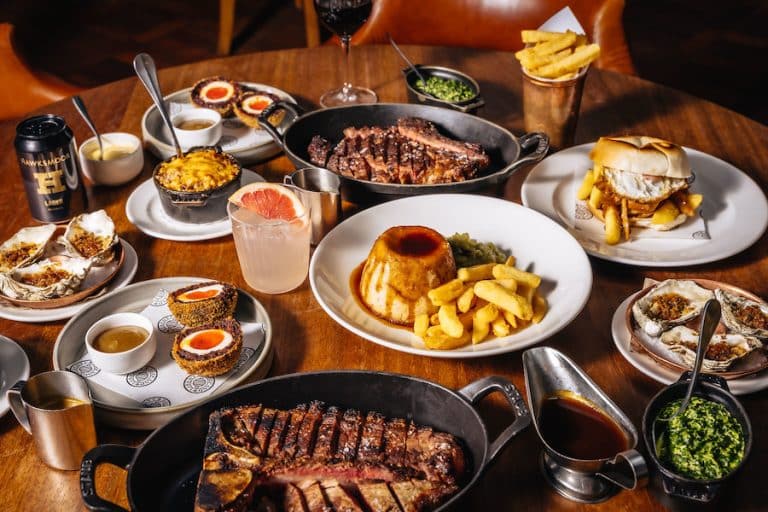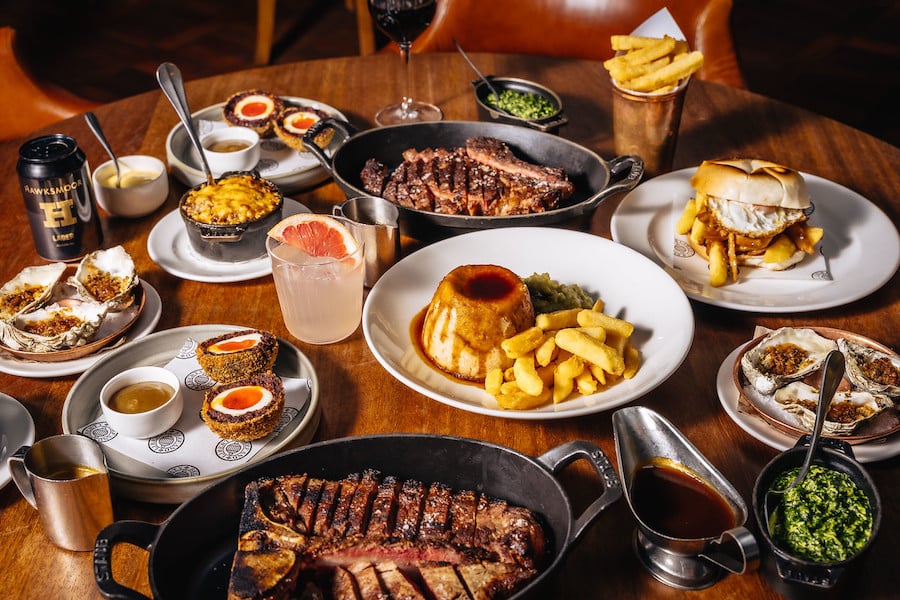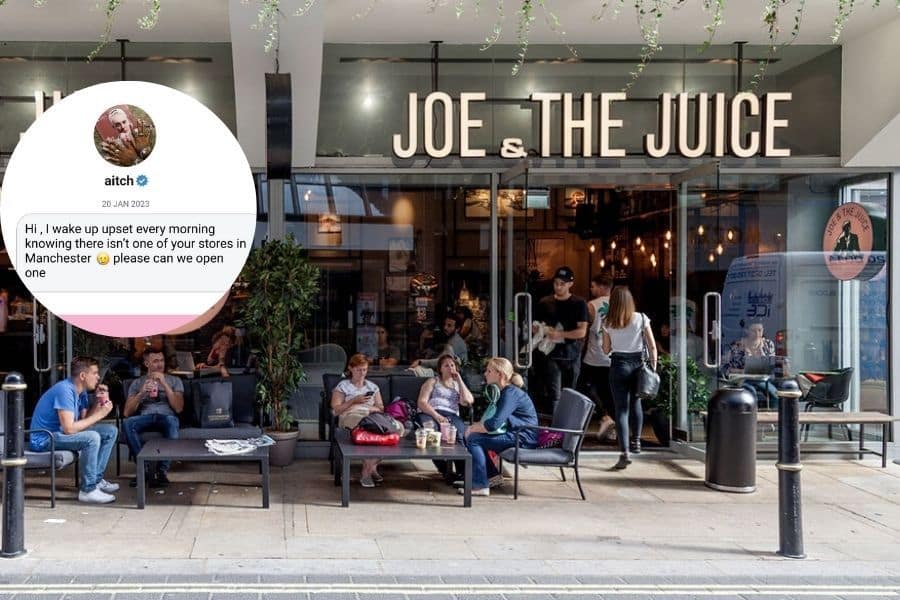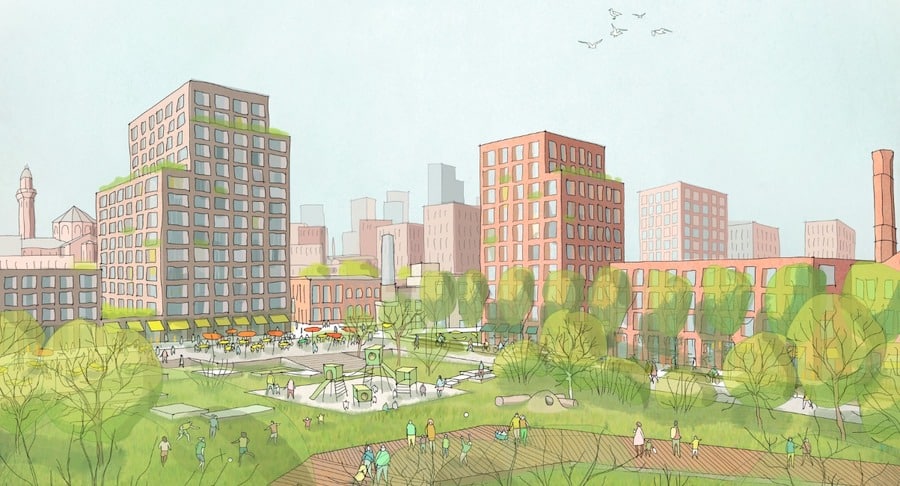“It feels a bit like a death, I’m in mourning” Beloved chef shares heartbreak at closure of his Manchester restaurant
- Written by Thom Bamford
- Last updated 5 months ago
- City of Manchester, Featured, Food & Drink, People
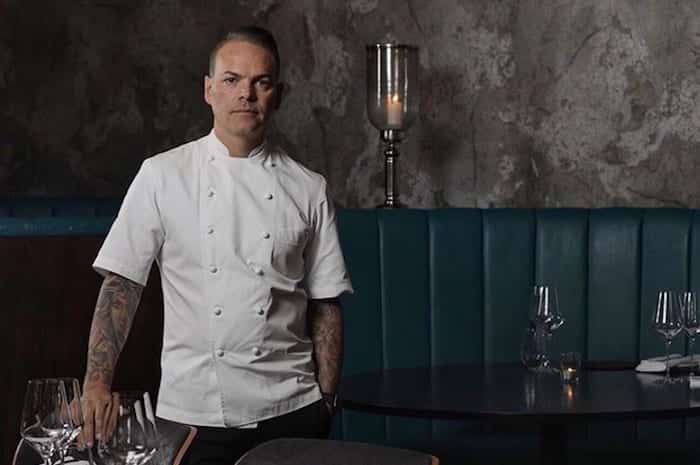
For the past ten years, Simon Wood has been one of Manchester’s brightest culinary stars.
His restaurant, WOOD, has been a symbol of the city’s skyrocketing gastronomic ambition and creativity.
Fresh off his triumph as the winner of MasterChef 2015, Simon was ready to prove that his passion for cooking and his belief in bold flavours could find a permanent home in Manchester’s increasingly sophisticated dining scene.
Simon Wood
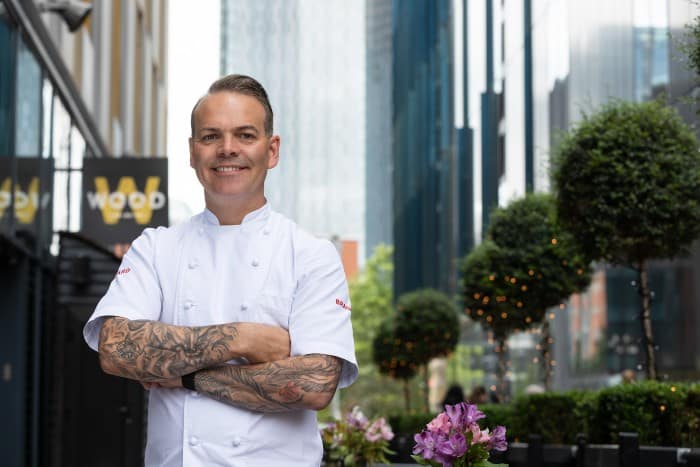
Over the next seven years, WOOD became a cornerstone of Manchester’s foodie culture, earning a loyal following, industry accolades, and respect from food lovers near and far.
But like many businesses in recent years, WOOD Manchester faced mounting pressures in the face of a changing economy, and earlier this week, Simon was forced to close its doors.
Though the restaurant may be closed, Simon Wood’s journey is far from over.
Through financial challenges, a difficult pandemic recovery, and personal hardships, Simon has stood strong—embodying the resilience that defines Manchester’s spirit.
His story is one of ambition, innovation, perseverance, and, ultimately, reinvention.
A chef who never shied away
Simon Wood’s rise to fame was a story of passion meeting opportunity.
From his humble beginnings in Chadderton, Oldham, he has always maintained a deep connection to his roots and an honest approach to cooking.
His cuisine at WOOD Manchester was innovative but approachable, always rooted in a philosophy of great produce and bold, natural flavours.
The restaurant’s success wasn’t just measured by the accolades it collected, though there were many: two AA Rosettes retained for seven years, inclusion in the Michelin Guide, and Simon himself being named Best Chef at the I Love Manchester Awards last year.
These recognitions underscored the quality of his work and his contribution to Manchester’s dining scene.
But Simon’s proudest achievements didn’t come in the form of trophies or reviews; they came from the team he built and the young talent he nurtured within his kitchen.
“I’m incredibly proud of the team we put together,” Simon said.
“Many of the young chefs who worked with me have gone on to do incredible things. Seeing their growth, helping them develop their skills, that’s what made it all worthwhile.
“It wasn’t just about me or the restaurant—it was about the people who came through those doors and what they went on to achieve.”
A champion for hospitality

In addition to being a celebrated chef, Simon also has become an outspoken advocate for the hospitality industry, not only in Manchester but across the UK.
Throughout his career, Simon wasn’t afraid to speak up for his team and for the industry, even when it wasn’t the popular thing to do.
Whether it was being interviewed by Piers Morgan, or during heated discussions on Good Morning Britain about the impacts of lockdown on the hospitality industry or standing his ground in front of critics like Claude Littner from The Apprentice, Simon never backed down.
His willingness to be a voice for those in hospitality earned him respect far beyond the walls of his restaurant.
“I’ve represented the industry not just locally, but nationally. I’ve had meetings with the Prime Minister, worked with the Night Time Economy panel, and collaborated closely with people like Sacha Lord.
“It’s about standing up for what’s right and making sure people know what we go through in this industry. It’s something I’ve always tried to do.” Simon said.
A job in politics?
The hospitality industry is a vital part of everyday life in the UK, yet it remains severely under-appreciated, especially when it comes to government support and recognition.
For Simon Wood, this lack of appreciation is baffling, and he believes it’s high time for a change.
“Let’s be honest, everyone encounters hospitality at some point—whether you work in it or use it for memorable occasions like birthdays, funerals, or parties,” Simon reflected.
“It’s always connected to food, restaurants, pubs, and kitchens; it’s always present in our lives.”
It’s not just the obvious moments that make hospitality so central to British life.
For Simon, it’s about the culture and the fabric of communities across the country.
Hospitality is much more than food and drink—it’s about human connection, providing a space for celebrations, memories, and daily sustenance.
“Whether it’s your local pub or a high-end restaurant, hospitality is there for every occasion. It’s ingrained in our way of life,” he said.
Yet, despite the industry’s significant role in society, Simon feels that the government overlooks its importance.
Hospitality isn’t just an industry for career chefs, bartenders, or servers; it’s a gateway for young people to step into the workforce, often for the first time.
“This industry serves as a stepping stone for many young people. It teaches them restraint, work ethic, and the value of hard work. It shows them how to maintain composure while dealing with difficult customers, such as those who are intoxicated. It’s truly a great launching pad.”
Many young people begin their working lives in hospitality, and for some, it remains their career path for years, even a lifetime.
Simon underscores how this industry can shape individuals, helping them develop essential life skills: “Some of the most remarkable individuals in the world started their careers working in bars, pubs, clubs, and other venues.”
Simon isn’t alone in his desire for greater recognition for the industry. Many prominent voices, such as Sacha Lord, have been working tirelessly to promote hospitality and ensure it gets the recognition it deserves.
Still, hospitality continues to be seen as a “non-skilled” profession.
“Many of us, including Sacha Lord and myself, work diligently to promote this industry, but it’s not regarded as a skilled profession,” Simon said with visible frustration.
The lack of respect for the work that goes into running a restaurant, bar, or pub undermines the dedication and passion that hospitality workers bring to their roles every day.
Hospitality representation at Westminister
The numbers speak for themselves. Simon told us that the hospitality industry is one of the largest sectors in the country.
“Aren’t we the fifth-largest sector in the country? It’s fifth or sixth.”
The point remains valid: hospitality is a massive contributor to the UK economy, yet the sector has no official representation at the governmental level.
Simon questions this imbalance with a pointed observation: “Why do all the other sectors—aviation, travel, and others—have dedicated ministers in Parliament? Why don’t we have a minister for hospitality?”
Simon believes that this lack of representation is a crucial reason why the industry has been struggling, particularly in the face of challenges like the COVID-19 pandemic and the ongoing economic pressures with energy bills and the cost of living crisis.
“We need someone who has experience in this field, someone like Sacha, who has worked in the night-time economy and can advocate for our industry in Parliament,” Simon insisted.
His passion for the industry is palpable, but so too is his frustration.
The government’s failure to adequately support and understand the intricacies of hospitality is a major concern for Simon and others in the sector.
He explains that the industry is far broader than many people realise, encompassing not just restaurants and bars but a vast network of associated businesses and services.
“Hospitality is far more extensive than just my restaurant. It encompasses door staff, DJs, entertainment, suppliers, and even the small businesses that grow flowers. It includes taxi drivers and artists—there are so many components involved,” Simon pointed out.
In a way, the hospitality sector operates like an ecosystem, with each part depending on the other.
When restaurants and bars thrive, so too do the many small businesses that supply and support them. Conversely, when hospitality suffers, the ripple effects are felt far beyond the kitchen or dining room.
“This industry affects so many people and their livelihoods, yet, despite its broad reach and significant impact, we’re still not viewed as a vital industry deserving of proper governmental support.”
The lack of recognition also extends to education, where hospitality is seldom promoted as a viable or prestigious career path. Simon believes this is a missed opportunity, given the exciting and diverse opportunities that a career in hospitality can provide.
“Why isn’t hospitality presented as a highly competitive and respected career path in schools and colleges?” Simon questions. “Working in hospitality can lead to incredible opportunities. You can travel the world, cook for movie stars, bands, and singers.”
As for whether Simon could see himself stepping up as a voice for the industry, he doesn’t hesitate. “Yes, I would readily do that. If opportunities arise, I’m willing to take stock,” he said with conviction.
His deep knowledge and passion for hospitality make him a natural advocate for the sector, and he’s already a prominent voice, regularly speaking out about the challenges and potential of the industry.
The challenges of modern hospitality
Like many restaurateurs, Simon found himself at the mercy of external forces that went far beyond the kitchen.
The pandemic was a massive blow, but it was just one of many pressures facing his business. Energy costs soared—£11,000 a month just for electricity—along with rising rent and wages.
On top of that, VAT on restaurant food in the UK remains at 20%, significantly higher than the rates across much of Europe. It all added up to an unsustainable situation for many in the industry, and Simon was no exception.
“When you’re paying £93,000 a year in business rates before anything else, and energy costs of £11,000 a month, you’re always fighting an uphill battle. The financial strain is immense,” Simon explained.
But despite these enormous challenges, Simon kept going for as long as he could, doing everything possible to keep WOOD Manchester afloat.
A personal toll
While Simon has been a tireless advocate for the industry, the toll that running WOOD Manchester took on him personally cannot be overstated.
Behind the scenes, Simon was dealing with his own health challenges—something he rarely spoke about publicly until recently. For years, he has been living with chronic pain, a result of a deteriorating spinal condition.
“I’ve got a crumbling spine that’s pressing on my spinal cord,” Simon shared.
“It’s something I’ve dealt with for years, but it’s not something I talk about often. You just get on with it. There were days when I was in agony, but I still went into the kitchen, took my painkillers, and got on with it.
“That’s the reality of running a restaurant—you don’t get time off for things like this.”
The physical pain was compounded by the stress of trying to keep the business afloat in the face of overwhelming financial pressures.
Simon’s resilience and determination kept the restaurant going for as long as it could, but ultimately, the weight became too much to bear.
“When it became clear that we couldn’t continue, I made the decision to stop trading,” Simon explained.
“It was one of the hardest decisions I’ve ever made, but it was the right one. I made sure that our staff were paid until the end, and we did everything we could to take care of them. But when the landlord started pushing for rent arrears, it just became impossible. That was the final straw.”
A new chapter
When WOOD Manchester closed its doors this week, it marked the end of an era for Simon Wood, but not the end of his story.
The closure, Simon says, was unavoidable given the financial pressures from various sectors.
But if there’s one thing that Simon Wood has proven, it’s that resilience is at the heart of his journey.
Even now, as he navigates the emotional and financial challenges of closing his restaurant, Simon is looking ahead.
He’s not leaving the hospitality industry—far from it. He’s already thinking about what comes next, whether it’s a new restaurant in Saddleworth or Manchester, or exploring new opportunities in media and events.
“I believe in the law of attraction, inspired by reading The Secret by Rhonda Byrne,” Simon shared.
“Despite the challenges and stress I’ve faced, I’m trying to shift my mindset toward positivity. Hopefully, I’ll find good news in my inbox or a voicemail from someone with an exciting opportunity.”
“What I would really like is something to provide stability for the next month—a chance to regroup mentally and recover from everything.
“It feels a bit like mourning, like experiencing a loss. There are mornings when I wake up and, for a fleeting moment, feel alright, only to be reminded that things have changed, and it hits hard.
“Yet, I see so many opportunities ahead, and I believe something good will come from this experience.
“It’s challenging to hear this right now, but I trust that someone out there has visited my restaurant, listened to me on the radio, or read my recipes in Brood magazine or on I Love Manchester.
“I’ve contributed to various initiatives and always tried to support our city and local charities, such as Eat Well. I’d be keen to do that again.
“I believe in karma, and I’m ready to earn my share of good fortune. It won’t just land in my lap, but I could certainly use a little luck right now.”
Through everything, Simon’s friends have been a constant source of support.
His business partner, a close friend, stood by him every step of the way, and her family has offered their unwavering support during the restaurant’s closure.
Simon also brought his son, Cameron, and girlfriend, Jordyn, into the business, working alongside them in the kitchen.
“Cameron and Jordyn both worked in top-tier places, working with Paul Leonard at The Forest side (one Michelin star) and Lympstone Mannor Micheal Caines (one Michelin star), as well as in France.
“They are both immensely talented chefs, and when I invited them back to work with me, they came on board because we wanted to build something special as a family,” Simon said.
Even though things didn’t go as planned, Simon remains grateful for the time they spent together, and he looks forward to seeing what they achieve next.
Looking forward to the next step
Simon Wood may have faced one of the hardest periods of his life, but he’s not letting it define him.
His passion for food and hospitality remains as strong as ever, and he’s optimistic about the future. Whether it’s cooking private dinners, hosting events, or taking on a new restaurant project, Simon is ready for whatever comes next.
“I’m not leaving hospitality; my life revolves around food. Everything I owned went into WOOD Manchester; I didn’t take anything out. But I’m not done yet,” Simon declared.
“I see so many opportunities ahead, and I believe something good will come from this experience.
“I just want to thank the people of Manchester and everyone who helped make it happen over the last seven years.”
As Manchester reflects on the legacy of WOOD, it’s clear that Simon Wood has left an huge mark on the city’s dining scene, with plenty more to come.
You can check out Simon Wood’s instagram by clicking here
- This article was last updated 5 months ago.
- It was first published on 4 October 2024 and is subject to be updated from time to time. Please refresh or return to see the latest version.
Did we miss something? Let us know: [email protected]
Want to be the first to receive all the latest news stories, what’s on and events from the heart of Manchester? Sign up here.
Manchester is a successful city, but many people suffer. I Love Manchester helps raise awareness and funds to help improve the lives and prospects of people across Greater Manchester – and we can’t do it without your help. So please support us with what you can so we can continue to spread the love. Thank you in advance!
An email you’ll love. Subscribe to our newsletter to get the latest news stories delivered direct to your inbox.
Got a story worth sharing?
What’s the story? We are all ears when it comes to positive news and inspiring stories. You can send story ideas to [email protected]
While we can’t guarantee to publish everything, we will always consider any enquiry or idea that promotes:
- Independent new openings
- Human interest
- Not-for-profit organisations
- Community Interest Companies (CiCs) and projects
- Charities and charitable initiatives
- Affordability and offers saving people over 20%
For anything else, don’t hesitate to get in touch with us about advertorials (from £350+VAT) and advertising opportunities: [email protected]


Legendary Manchester restaurant to undergo “huge transformation” under new ownership









